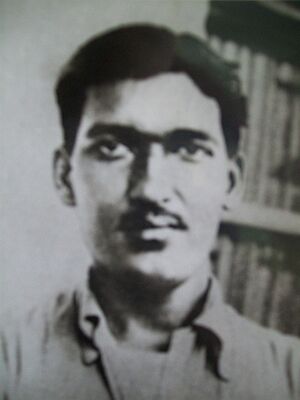Ashfaqulla Khan facts for kids
Quick facts for kids
Ashfaqulla Khan Dilzak
|
|
|---|---|

Khan in 1919
|
|
| Born | 22 October 1900 Shahjahanpur, North-Western Provinces, British India
|
| Died | 19 December 1927 (aged 27) Faizabad, United Provinces, British India
|
| Cause of death | Execution by hanging |
| Occupation | Revolutionary |
| Organization | Hindustan Republican Association |
| Known for | Being a mastermind behind the Kakori train robbery |
| Movement | Indian independence |
Ashfaqulla Khan was a brave Indian freedom fighter. He was born on October 22, 1900, and sadly passed away on December 19, 1927. He played a big part in India's fight for independence from British rule. Ashfaqulla Khan also helped start the Hindustan Republican Association, a group working for India's freedom.
Contents
Early Life of Ashfaqulla Khan
Ashfaqulla Khan was born in Shahjahanpur district, which was part of British India. His parents were Shafiq Ullah Khan and Mazharunissa. He came from a family of Pathans who were landowners. Ashfaqulla was the youngest of five children in his family.
When he was in school in 1918, police searched his school. They arrested a student named Rajaram Bhartiya. This was because of the Mainpuri Conspiracy. In this event, activists collected money by looting to print books against British rule. This incident made Ashfaqulla Khan want to join the fight for freedom.
Joining the Freedom Movement
Ashfaqulla Khan met Ram Prasad Bismil through a friend. Bismil was a revolutionary involved in the Mainpuri Conspiracy. Ashfaqulla quickly became good friends with Bismil. He joined him in many activities for India's freedom. These included the Non-Cooperation Movement and joining the Hindustan Republican Association.
Both Bismil and Khan were also poets. Ashfaqulla Khan wrote Urdu poems using the pen name Hasrat. He was inspired by Lenin and the Bolshevik Revolution in Russia. He believed in helping poor people and stopping rich capitalists from controlling everything. He also spoke against religious divisions, seeing them as a British tactic to control Indians.
The Kakori Train Robbery
The revolutionaries of the Hindustan Republican Association needed money. They wanted to buy weapons and ammunition. So, they held a meeting in Shahjahanpur on August 8, 1925. They decided to rob a train carrying government money near Kakori. The HRA had done similar train robberies before. They were inspired by Russian revolutionaries who used robberies to fund their operations.
Planning the Robbery
Ashfaqulla Khan was at first against the Kakori train robbery plan. But other members of the HRA liked the idea. So, he agreed to take part in it.
On August 9, 1925, Ashfaqulla Khan and other revolutionaries acted. These included Ram Prasad Bismil, Rajendra Lahiri, Sachindra Bakshi, and Chandrashekhar Azad. They attacked and robbed a government train in Kakori, near Lucknow.
After the robbery, the British government started a huge search. They wanted to catch everyone involved. On October 26, 1925, Bismil was caught by the police. Ashfaqulla Khan escaped to Nepal to avoid being arrested. From Nepal, he went to Kanpur and then Daltonganj. There, he worked as a clerk using a different name.
Capture and Trial
Eventually, Ashfaqulla Khan decided to go to Delhi. He wanted to continue his revolutionary work there. In Delhi, he met a friend from Shahjahanpur. Sadly, this friend secretly told the police where Ashfaqulla was.
On December 7, 1926, Ashfaqulla Khan was caught and arrested by the Delhi Police. He was held in the District Jail at Faizabad. A legal case was started against him.
The Kakori Trial
The trial for the Kakori train robbers took place in Lucknow. It lasted for more than a year. Many people were interested in the case. The HRA had stated in 1925 that they were not "terrorists." They saw their actions as fighting back against the unfairness of the colonial government. While in prison, Ashfaqulla Khan wrote a letter. He said that he did not want to spread violence. He only wanted to help India become independent.
Death and Legacy
The court decided the outcome of the Kakori case. Ram Prasad Bismil, Ashfaqulla Khan, Rajendra Lahiri, and Roshan were sentenced to death. Others received life sentences. Ashfaqulla Khan was sentenced to death by hanging. He was executed on December 19, 1927, at the Faizabad Jail. He is remembered as a martyr for India's freedom.
After the hangings of Khan, Bismil, Lahiri, and Roshan, the HRA changed its name. It became the Hindustan Socialist Republican Army. The group then officially started to follow socialist and Marxist ideas.
See also
- Hindustan Socialist Republican Association
- Mohammad Abdullah
- Sher Ali Afridi
- Shivaram Rajguru
- Ram Prasad Bismil

